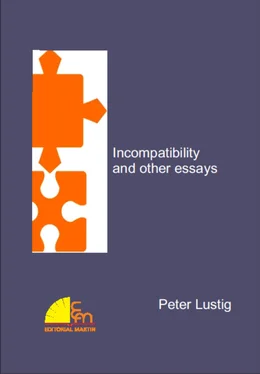Once all hell has broken loose, the most anybody can hope for is that he will manage to slip through mayhem unnoticed. Nobody could blame a person for absconding from his responsibility toward his peers or “equals”, under circumstances devoid of ethical constraints (best described by Churchill’s claim that he was fighting for “my country, right or wrong”), in conditions of all out war! However, there are always some who are prepared to do more. They are the ones cut out to become leaders; even if, for the most part, they should only become such in thought (since there can be only one successful leader, always on the winning side, in any situation).
Broadly speaking, this attempt to encompass a reality associated with recent history is intended to help resolve the problem posed by the dearth of ideas capable of regulating a society that has surpassed the existing proviso for its own survival, on account of demographic and technological developments. This society may have been split into irreconcilable camps for cultural reasons; but it is more probable that these, chiefly expressed in terms of religious affiliation, should be reflecting economic conditions, rather than endorsing any irreducible incompatibilities. People everywhere tend to have similar goals and it would be reasonable to expect a person to want to adjust to a global environment, since that is the sort of world in which he must find his place.
It is well known that many would disagree with this outline. They make a point of upholding certain cherished cultural values. Some hard line moral imperatives are resilient to compromise, particularly as they are understood by the Muslim militancy. Conceivably, it is the religious leaders who are bound to present an unflexing front regarding the application of principles, to the extent that they should be preaching extremism and holy war (as an alternative to conventional war, which they could not muster, for the time being, due to an, as yet, unbridgeable technological backlog; although nobody can tell whether the gap will be closed sooner than later).
Once the threat of a Muslim conspiracy, worldwide, has taken root -as is the case-, the Muslim presence has added fear to the spontaneous rejection of its deliberate unconformity. It is not past the popular imagination to think of these people as a threat to world peace, failing to note the difference between a political crime, like terrorism, practised by fanatics, and an outright military onslaught, as was carried ought by the Nazis, in Europe, or the Japanese, in the Far East.
As a precaution, it would be sensible to keep track of the demographic expansion of a community that shelters in parochial custom, while it refuses to adapt and it grows in size. This does not amount to proposing that every Muslim deserves to be treated as a dangerous extremist, or even as a “sleeper”, because he looks and dresses differently, as is often unreasonably maintained. But the demographic effect of the presence of a larger number of Muslims might exert an influence similar to the much vaunted informality brought about by proletarianization, as promoted by the American servicemen wherever they were posted, after 1945. The result has been that people everywhere dress as if they were living in the U.S. and local costume is kept, at best, for ceremonial use on holidays. Not to mention the “refinements” of style trends that have done away with class distinctions linked to bourgeois conventionality. Hollywood and the cinema in general may also have contributed to this end; but one might argue that it all started with socially non-descript American soldiers being transported far and wide, because that was when it was first noticed. One can hardly say that this lapse into informality has improved the appearance of the milling city crowds; but the change is mainly on the outside. If, along with the hidden threat of terrorists becoming embedded in a society, the growth of this exotic flower associated with cultural defiance were to take control of the political system, in a country, invasion by means of demographic displacement would have anticipated a war of conquest, while actually making it redundant. There have been numerous precedents of this kind of “wandering” throughout history (and even earlier, before “homo sapiens” was left as the only surviving human type), not the least of them having taken place in Britain during the first millenium A.D., of which perhaps more is known than about most other such instances that took place in Europe, in spite of widespread illiteracy, at the time. Can it be said that the repeated cultural backslides, due to successive invasions that followed upon the withdrawal of the Romans, stood in the way of defining a national character, or that England was left at a disadvantage, in the long run, because it was made vulnerable to the Norman invader? One is inclined to believe that barely a physical or cultural trait remains in today’s population that could be traced farther back than 1066. Beyond that, one would have to move up to the XVII century to evaluate political and social developments that account for the stability that is taken for granted today. If anything, this stability, a lasting tribute to the traumatic overthrow of Charles I, in 1649, stems from the decision to abolish violence as a method to warrant political continuity and also because of permanent involvement with social progress, particularly as from 1945, when the war was won after everything else had been lost - except acquiescence to some kind of rule of law - and the welfare state was established, since now everybody was hungry and poor, in the wasteland that was post war Europe, and not least Britain.
With respect to how the present situation can be addressed (since the law does not provide for an instance in which a large sector of the polity chooses to exclude itself), it may presumably suffice to make up a list of regulations, to put an end to that, and seeing to it that they are enforced. A long way from stimulating bloodshed or recommending mass deportations, one would think.
III.Political Delusions (Liberalism)
Cromwell’s interregnum effectively put an end to the period of transition between conspiring warlords -intent on wresting the throne from their rivals to crown one of their own- and the consolidation of parliamentary procedure, legitimized chiefly by greater participation of the Commons. At this stage, Hobbes’ “Leviathan” appeared, as a metaphor to enhance the monarchy; but it is unlikely that it would have influenced the course of events, to the extent that it was later credited for having led toward implementing the three independent powers of parliamentary democracy.
Needless to say, Hobbes had no interest in the common folk and he would not get involved with the peasants and the poor, as they played no part in government. In fact, the idea that “the great unwashed” should have a say in decision-making was never part of the discussion, not even when “Liberalism”came to the fore, more than half way through the next century. Neither Locke, Hume, the English constitutionalists, nor the leading lights of the Scottish Enlightenment ever came close to getting involved with social progress, in the same way that the Reformation never approached the extremes, in England, that it reached on the Continent, where it might well have been hailed as a precursor to bloody revolution. No definitive consideration was given to the possibility of establishing a republic, in Britain, in the course of shaping the institutions of a parliamentary monarchy; only in America was such a thing envisaged.
The uprising against “taxation without representation” had little bearing on the ordinary denizen, in the Colonies, by contrast with the revolt of the “sans culottes”, in France, a few years later. More likely than not, the American Revolution was led by the gentry, with the purpose of ratifying property rights and trade interests: viz. demanding ”freedom” from domination by legislation enacted at Westminster and enforced by the King’s redcoats.
Читать дальше












